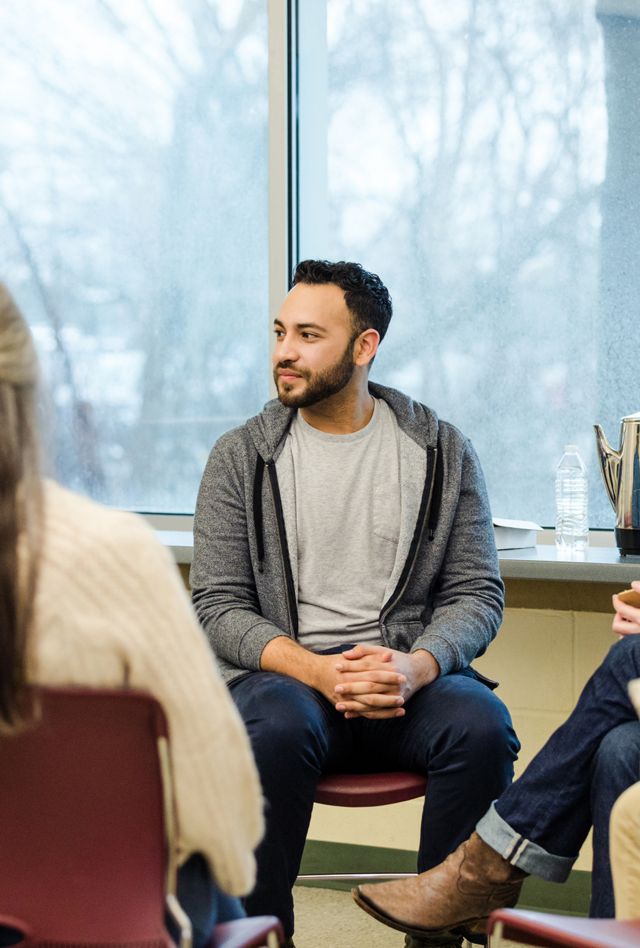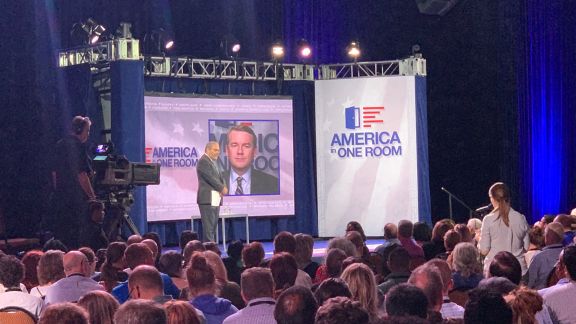Building Trust with Veterans Through Rigorous Research Design

Author
Senior Research Methodologist
Giving voice to former U.S. service members. Explore the solution.
October 2025
How thoughtful methodology transforms skepticism into meaningful participation.
As a senior research methodologist who has spent several years conducting research with Veterans, I’ve learned that methodology isn’t just about numbers and sampling—it’s about earning trust through rigorous, respectful research design.
When I first joined NORC, I had no experience working with Veterans. But when the opportunity arose to work on the ASCEND for Suicide Prevention project with the Department of Veterans Affairs, I was eager to contribute. Having family members who served—my grandfather in the Army and my uncle in the Marines—I’ve always appreciated the bravery and sacrifices made by our military members.
The Trust Challenge: “What Makes This Different?”
Through countless cognitive interviews and focus groups with Veterans, I’ve discovered the central challenge in Veteran research: skepticism born of “survey fatigue.” Veterans get surveyed constantly, and they have legitimate questions:
- “What makes this different from every other survey I’ve received?”
- “How will you protect my information?”
- “What specific impact will my participation have?”
They don’t want generic promises about “improving Veteran services”—they want concrete details about how their data will be used and what changes will result. And this is a perfectly valid concern that we methodologists must address through our research design.
Learning from What Doesn’t Work
In our ASCEND project, we learned valuable lessons about reaching underrepresented groups within the broader Veteran population. Working with lead researcher Vince Welch, we conducted an experiment with our recruitment materials. We designed postcard inserts featuring images that reflected specific demographic identities—female Veterans would receive postcards with pictures of female Veterans, Asian American and Pacific Islander (AAPI) Veterans would see pictures of AAPI Veterans, and so on.
We hypothesized that Veterans would be more likely to respond to the ASCEND survey if they saw images that reflected salient aspects of their identity. The results? Null findings. The experiment didn’t work as expected.
When we conducted follow-up focus groups to understand why, Veterans told us something important: it wasn’t their demographic identity that mattered most—it was their identity as Veterans. They wanted to see images that represented the broader Veteran community, not narrower demographic categories.
This taught me that assumptions researchers make about what will resonate with participants aren’t always accurate. Direct engagement with the population you’re studying is essential.
The Veterans Insight Panel: Solving Real Methodological Problems
From a methodologist’s perspective, I’m particularly excited about the new Veterans Insight Panel. This isn’t just another research tool—it addresses concrete challenges I’ve encountered in Veteran research.
One of them is recruiting participants for qualitative research. We recently used social media to recruit Veterans for focus groups and discovered that some participants weren’t actually Veterans. Having to explain this data quality issue to our client, then recruit additional participants and update our protocols, was costly and time-consuming.
The Veterans Insight Panel would have saved us that lost time and money. The panel will provide access to pre-validated Veterans across the United States, similar to our AmeriSpeak® Panel but specifically for the Veteran population. This means:
- Verified participants: No more concerns about fraudulent responses
- Efficient recruitment: Direct access to hard-to-reach Veteran subpopulations
- Demographic targeting: Ability to oversample specific groups when needed (such as branch(es) served in, years of service, or separation date)
- Quantitative and qualitative capabilities: Support for surveys, cognitive interviews, focus groups, and more
The Research That Matters
What keeps me motivated in this work is knowing its impact. The data we collect through ASCEND and other Veteran projects goes directly to Congress and VA decision-makers who allocate resources for Veteran services. Our Wounded Warrior Project research, focusing on post-9/11 wounded warriors, addresses urgent issues like traumatic brain injury and toxic exposures.
During sensitive interviews about suicide prevention, Veterans often thank me at the end for giving them the opportunity to share their experiences. It’s emotional work but knowing that the VA is investing resources in this kind of research—and that it will inform real policy decisions—makes it deeply rewarding.
A Platform for Veteran Voices
The Veterans Insight Panel represents something important: a platform for Veterans to share their experiences in ways that can inform policy, improve services, and ultimately benefit the Veteran community. The data will be collected by trusted researchers committed to confidentiality and rigorous analysis.
NORC has operated panels like AmeriSpeak for years, demonstrating our capability to maintain high-quality, representative samples. This Veteran-specific panel is Veteran-informed—developed with actual Veterans involved in the design process, not just researchers making assumptions about what Veterans need.
For researchers considering Veteran studies, transparency in communications will be crucial. Veterans need to understand not just what data you’re collecting, but your credibility, your track record with Veteran research, and exactly how the findings will be used to benefit the Veteran community.
Looking Ahead
The possibilities with the Veterans Insight Panel are expansive. Beyond traditional surveys, I’m excited about using it for cognitive interviews and focus groups—really sitting down with Veterans to understand their experiences more deeply—and mixed-methods research that combines quantitative and qualitative information. It’s going to be a win-win for both researchers and Veterans.
For over 80 years, NORC has built a reputation for objective, nonpartisan research with rigorous confidentiality protections. We have our own Institutional Review Board and thorough protocols for every study. The Veterans Insight Panel extends this same commitment to excellence specifically for Veteran research.
As someone who has learned firsthand that Veterans’ insights often differ from researchers’ assumptions, I believe this panel will help us ask better questions, design more effective studies, and ultimately produce research that truly serves those who have served our country.
Suggested Citation
Fordyce, E. (2025, October 28). Building Trust with Veterans Through Rigorous Research Design. [Web blog post]. NORC at the University of Chicago. Retrieved from www.norc.org.







